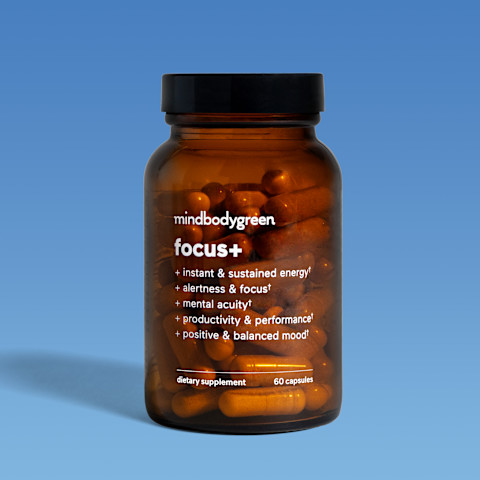
It's telling that the optimal recommended video length on TikTok is between 21 and 34 seconds. These days, that's about how long our attention spans tend to last.
Our constant task-switching is—unsurprisingly—not so great for our brains. "Switching back and forth between tasks is burning up the brain's primary fuel source, which is oxygenated glucose. The brain has to 'travel a path' to go from one task to another, which uses fuel," Chris Lee, a neuroscience and technology expert, tells mindbodygreen.
Multitasking also drains our cognitive reserves. Think of the brain as its own person: If you ask it to hold on to too many things, Lee explains, eventually it's going to run out of hands and drop something. No matter who you are, research shows that task performance deteriorates1 when you attempt to take on more than one task at a time.
In an age of information overload, cultivating attention has never been more important—or more difficult. We asked Lee to share the best strategies he's found for tuning out distractions and living a more focused life:
Minimize temptation
"Your capacity to be distracted directly correlates to your ability to focus," says Lee. This means that step No. 1 on any focus journey is getting rid of distractions that are vying for your attention.
For Lee, this means keeping his desk empty save for a mouse, a keyboard, and the occasional cup of coffee, using software to reduce his screen time, and storing his television out of sight in the garage until designated TV times with his daughter.
Action step:
Take a day to notice all the distractions that keep you from achieving your goals and leave you feeling icky. Write them down and consider how to replace them with things that encourage more positive habits or hobbies, like paper for writing or drawing or a stack of books to read.
Take strategic breaks
Lee estimates that the average person has about four hours of brainpower to dedicate to focused work daily. But we don't need to knock all four of these hours off in one go. Instead, he's found success in building "small cognitive breaks" into his day with the help of a timer.
He'll typically set his for 25 minutes of work, followed by a five-minute break, then another 25 minutes of work, followed by another five-minute break. He'll schedule these focus hours during the times of day he is mentally sharpest, and he'll know exactly what he wants to achieve going into each one.
Twenty-five minutes may not sound like enough to accomplish much, but Lee finds that the strict time parameter has helped him stay significantly more productive and on task. Then, the five-minute break allows his brain to recharge but not go offline entirely. Instead of using it to check his phone, he'll typically walk around his home or do some exercises.
Action step:
Try stacking your work blocks with short breaks. Use your breaks to do something mentally restorative but not overly distracting—knock out some pushups or planks or look at the sky out your window, for example.
Have your brain health nonnegotiables
Along with minimizing distractions and designating focus time, Lee uses meditation, movement, and education to build his cognitive reserves. These three research-backed brain-boosting habits are a nonnegotiable part of his daily routine.
"I can do all of them in three minutes. I can do them in 30 minutes apiece. It just kind of depends on how much time I have available," he explains. No matter how long he does them, he finds they improve his ability to focus and enhance his willpower.
Action step:
Create a list of two or three brain-healthy habits you can commit to doing daily—no matter how busy you are. Maybe you complete a brain game or puzzle, do a breathwork routine, or take a walk without your phone. Taking a targeted brain supplement like focus+—which features extended-release caffeine, ginseng to combat brain fatigue, and guarana to improve mental alertness—can be a simple addition to your daily brain health checklist.*
Be consistent
Like any skill, building focus takes consistent practice. It's something you need to commit to daily—not just Monday through Friday from 9 a.m. to 5 p.m. "I think the big challenge that most people run into is that they'll be exceptionally disciplined until Friday, and then the discipline gets undone [for the weekend]. And then, on Monday, life gets really hard again. That yo-yo-ing effect stresses out the brain," says Lee.
This isn't to say you need to burn yourself out working on the weekends. Instead, consider how you can continue to set aside blocks of focus time for activities that bring you joy. Maintaining a consistent sleep schedule and doing your brain health nonnegotiable, even on your "off" days, will also be helpful.
Action step:
Don't forget about your routine come Saturday! Set aside "focus time" during the weekends or days when you are not doing your typical work to make art or music, read, or do another activity that brings you joy and fulfillment. This will make the transition back to work on Monday much easier.
The takeaway
Ultimately, tuning out distractions and building your capacity to focus is not about depriving yourself. Instead, it's about freeing up more of your time to dedicate to the things in life you actually love to do. By minimizing distractions, taking strategic breaks, and sticking to a few brain-healthy habits, you can expand your attention span and give every day the focus it deserves.

